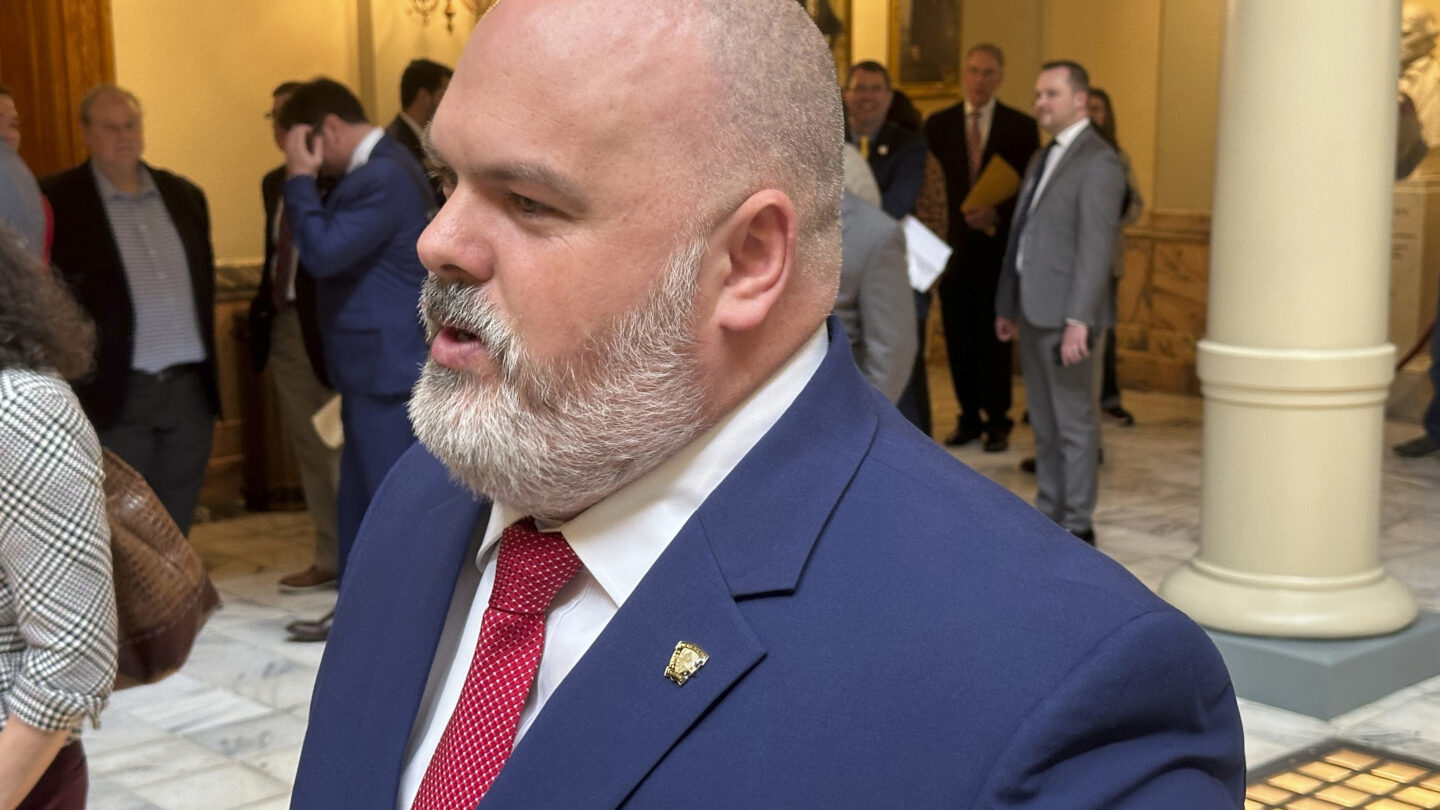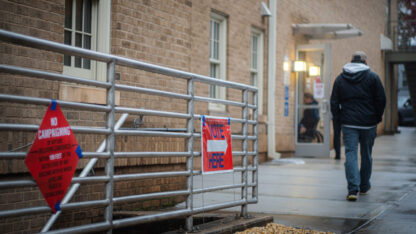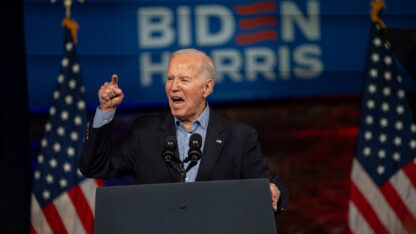At least one Democrat and one Republican are contesting each of Georgia’s 14 congressional districts as candidates qualifying for the 2024 elections closed Friday, although some of the candidates will face long odds in November when none of Georgia’s congressional districts are likely to be competitive.
State legislative races will see less competition than two years ago, with fewer incumbents facing major party opposition, even as more voters are expected to come to the polls in a presidential election year.
Before November will come the May 21 primaries and June 21 runoffs, when the parties decide on nominees. Some major-party candidates could still gain November opposition from independents and Libertarians, who have until July 9 to qualify.
Western Georgia’s 3rd Congressional District is the only open congressional seat, where Republican U.S. Rep. Drew Ferguson is stepping down. Six Republicans including former Trump administration official Brian Jack and former state legislators Mike Crane, Mike Dugan and Philip Singleton will battle for their party’s nomination. Democrats Val Almonord and Maura Keller will compete to carry their party’s standard in the strongly Republican district.
Here’s a look at some other elections:
Incumbents facing primaries
Two Democratic congressional incumbents in metro Atlanta will face primaries in districts substantially redrawn in court-ordered redistricting. U.S. Rep. Lucy McBath is running in a reconfigured 6th District that includes parts of Cobb, Douglas, Fulton and Fayette counties. She’s opposed by state Rep. Mandisha Thomas of South Fulton and Cobb County Commissioner Jerica Richardson. The winner will face Republican Jeff Criswell.
Longtime U.S. Rep. David Scott faces six Democratic primary opponents in the 13th District, which now includes all of Rockdale County and parts of Clayton, DeKalb, Gwinnett Henry, and Newton counties. Challengers include Marcus Flowers, who ran against Marjorie Taylor Greene in northwest Georgia’s 14th district in 2022, as well as Mark Baker, Brian K. Johnson, Uloma Kama, Rashid Malik and Karen Rene. Republicans Johsie Cruz Fletcher and Jonathan Chavez seek the GOP nomination in the Democratic-leaning district.
Republican U.S. Rep. Barry Loudermilk also has opposition from his own party, with Lori Marie Pesta and Mike Pons seeking the nomination in the 11th District. It includes parts of Cobb and Cherokee counties and all of Bartow, Gordon and Pickens counties. Meanwhile, Antonio Daza and Katy “Kate” L. Stamper seek the Democratic nod.
Other congressional primaries
In northwest Georgia’s 14th District, four Democrats have lined up for the right to take on Greene, the high-profile Republican incumbent. They include Clarence Blalock, Shawn Harris, Deric Houston and Joseph Leigh.
In southwest Georgia’s 2nd District, Republicans A. Wayne Johnson, Chuck Hand, Michael Nixon and Regina “Reggie” Liparoto are vying to face longtime Democratic incumbent Sanford Bishop.
In middle and south Georgia’s 8th District, the winner of Democrats Darrius Maurice Butler and Vince Watkins will challenge Republican incumbent Austin Scott.
In northeast Georgia’s 10th District, Democrats Alexandra “Lexy” Doherty and Jessica Fore are vying to face first-term Republican incumbent Mike Collins.
In the 12th District around Augusta, the winner of Democrats Daniel “DJ” Jackson and Elizabeth “Liz” Johnson will face Republican incumbent Rick Allen
On to November
Major party nominees are set for November in four other districts.
In coastal Georgia’s 1st District, Democrat Patti Hewitt and independent Joyce Marie Griggs are challenging incumbent Republican Buddy Carter.
In the 4th District in parts of DeKalb and Gwinnett counties, incumbent Democrat Hank Johnson faces Republican Eugene Yu and independent Ansel Postell.
Republican John “Bongo” Salvesen is challenging incumbent Democrat Nikema Williams in the 5th District, which includes parts of Fulton, Clayton and DeKalb counties.
And in northeast Georgia’s 9th District, Democrat Tambrei Cash squares off against Republican incumbent Andrew Clyde.
Unopposed state lawmakers
Many fewer state lawmakers face major-party opposition than in 2022. Two years ago, there were 17 unopposed Georgia Senate incumbents, while this year, there are 23, including 13 Republicans and 10 Democrats.
Overall, Democrats aren’t contesting 18 Republican-held districts, while Republicans aren’t contesting 15 Democratic-held districts, meaning only 33 districts will have general elections including two major-party candidates in November.
More members are also unopposed in the 180-member House. In 2022, 29 House incumbents faced no opposition, while this year there are 70 incumbents without major-party opposition — 42 Republicans and 28 Democrats. That includes Republican House Speaker Jon Burns of Newington. In the House, Democrats have conceded 45 districts to Republicans, while the GOP has conceded 43 districts to Democrats. That means only 92 House districts will have November elections that include two major-party candidates.STATE SUPREME COURT
In a May nonpartisan race, former Democratic U.S. Rep. John Barrow is challenging state Supreme Court Justice Andrew Pinson for a six-year term on the state’s high court. Gov. Brian Kemp appointed Pinson in 2022 and this is Pinson’s first time facing election.
Three other state Supreme Court justices are unopposed for reelection, including Chief Justice Michael Boggs, Presiding Justice Nels S.D. Petersen and Justice John Ellington.
No Public Service Commission Elections
Elections to the Public Service Commission remain in limbo after a challenge that asked a federal court to order commissioners elected by district instead of statewide. The 11th Circuit U.S. Court of Appeals ruled in December that elections should remain statewide for the body that regulates Georgia Power Co. and other utilities. However, plaintiffs who want district elections are asking the U.S. Supreme Court to consider the case.
Republican Commissioners Tim Echols and Fitz Johnson were supposed to run for to six-year terms in 2022, but those elections never happened. Republican Commissioner Tricia Pridemore was supposed to face voters this November. Instead, all three will keep serving.
Special elections could happen before 2026 if the case is resolved.









